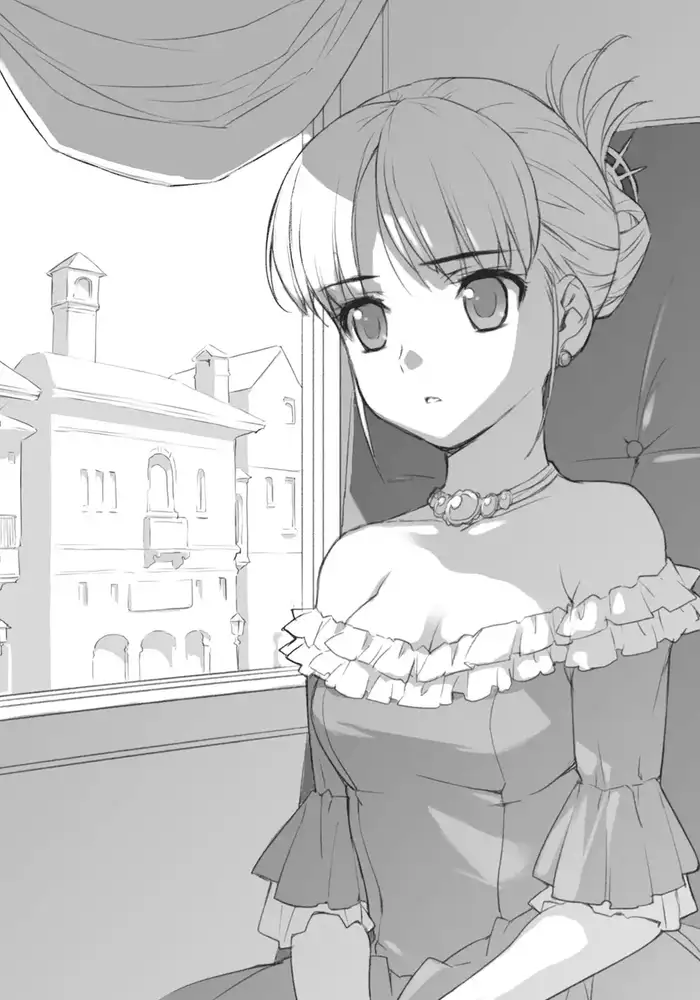Free preview






Prologue
On a day like today, when I had been beaten to a pulp and robbed of my earnings, I dunked my swollen face into a puddle by the roadside. That's when I recalled the girl in the white dress.
In the field of sunflowers, her silver hair had flowed. She looked straight into my eyes—hers the same color as her hair.
Promise me you won't cry anymore.
Even if you're lonely, doing bad things isn't okay. Understood?
I had nodded earnestly in response. She smiled, beaming like a sunflower, and stretched to hug me. She didn't mind her clean dress getting dirty. For some reason, I wanted to cry, even though I had just promised not to. I held back my tears. Her warmth and pleasant scent brought forth feelings unfamiliar to me. They washed away the pain, sadness, and misery.
Lifting my face from the half-frozen puddle, I wiped my forehead with the cuff of my sleeve. The mixture of dirt and blood clung thickly to the frayed fabric. Touching my head, I felt two large bumps.
The group that had attacked me earlier were street orphans of Levam. Mistaking me for an Amatsu person, they struck suddenly. There were six of them. I stood no chance. They took all the money I had earned from collecting scrap metal earlier today.
It's not the first time I've been attacked by an orphan group. Here in the Amadra district of the Rio de Este slum, violent incidents were as common as the crowing of roosters. No one paid them any mind. Being half Amatsu from my mother's side and half Levam from my father's side made it worse—both groups targeted me. Ever since my mother was stabbed to death by a drunkard about a year ago, I belonged to neither group. I survived day by day in this slum, friendless and alone.
Bestad.
In this city, they branded people with two ancestries a Bestad and shunned us. In a buffer zone like San Martilia, where two powers intermingled and the socio-political climate changed often, a Bestad could belong to either nation. To them, we were the epitome of an untrustworthy people. But in truth, being a Bestad brought no advantages. We were rejected by both sides, facing only endless disdain and persecution. That's why I'm destined to be trampled on until the day I die.
I clutched my aching head with one hand and my empty stomach with the other. Shivering in the frozen air, I wandered the streets looking for a place to sleep. Every so often, a harsh, metallic cough burst from deep within my lungs.
Rotten vegetables, household trash, horse dung, and urine littered the cobblestone streets. People who had never bathed in their lives wore clothes that had never been washed, swigging gin as they passed by, hurling coarse words at each other with mouths that had never known a toothbrush. Various body odors hung in the air and dark substances fell from the sky, splashing down on the contents of the slop buckets thrown out of homes. It was a disaster for anyone unlucky enough to be hit directly, as they had to bathe even in the dead of winter. I tried to walk close to the buildings, glancing up at the December sky.
The narrow slice of sky, framed by the buildings, was a solid gray.
I haven't seen the sunlight in quite some time.
Since everyone burned coal stoves in winter, a thin layer of charcoal-colored smog covered the city, filling the air with soot. The city's air likely caused my cough.
The last time I had eaten was three days ago. My body was weak, and I felt my extremities freezing. The pain and the sadness brought me to tears, but I held back because I had promised that sweet girl I wouldn't cry anymore.
But even so, there was only so much one could take—there were limits to everything.
I stopped moving forward.
I collapsed by the roadside, lying down on the cold, dirty street.
Surviving alone in this city as a Bestad was impossible. The Levam and the Amatsu people would never get along. Consequently, there was no place for me, who carried the blood of both groups. If a resting place existed, it would not be on this earth, but beyond the clouds, above the sky.
I'll sleep here.
I'll close my eyes and think of that girl. Then by morning, I'll just be another frozen orphan’s corpse. The street cleaners will reluctantly grab my lifeless hand, throwing my body into the trash heap with dead dogs and crows. Then they'll incinerate it at the outskirts of town. That's fine. Living is sad and painful. It's an ultimately meaningless task. If so, I'd rather become nothing.
Just as I made up my mind, a distant thunderclap struck my ears.
The vibration was deep and heavy, shaking the atmosphere and reaching down into my stomach.
I quickly realized it wasn't thunder. I turned onto my back and looked straight up at the cloudy sky.
The sky raged like a stormy sea, the clouds boiling, murmuring, and swirling around.
A sound like the buzzing of giant bees came from beyond the storm.
The thick clouds that hung over the city were torn apart like silk.
Gaps opened up, and beams of sunlight streamed through, slicing the dark sky and painting the filthy streets gold.
Then, the caterpillar-shaped flying battleship descended, tearing through the clouds. The large vessel was over 110 meters long and weighed more than 40,000 tons. Six massive lift devices that were attached to the rounded hull ripped through the sea of clouds with tremendous noise. It's intimidating presence commanded the sky. Semicircular bastions jutted out from both sides, the large-caliber guns monitoring the entire airspace.
Ohhh!
The people in the streets called out—the Levam cheering with pride, the Amatsu clenching their teeth in frustration. Everyone stopped, craning their necks to the sky, and gazed up at the majestic battleship, as if it were a messenger from the heavens.
The sight of 60,000 tons of metal serenely flying through the sky always inspired awe. It was a feat made possible by the immense power of hydrogen cells. Even I, lying on the street and near death, felt ecstacy in my chest. It wasn't a bad last scene to witness in this world.
The lift devices roared. Glaring down upon the Amadra district, the battleship turned its bow east. Perhaps to provoke the border areas of the Imperial Amatsukami. The Levam royal family, flaunting their aerial strength, aimed to carve out more Amatsukami territory. Lately, such displays of power by the airship fleets had become more frequent.
A tremendous roar, like crossing an icy sea, drug behind the flying battleship as it pushed through the clouds ahead of it and left my field of vision. The sky cleared up significantly, and the crisp December sunlight brightened up the streets.
A dozen propeller fighters, known as Aires, flocked around the warship. Although the sound of the lift devices overpowered the propeller noise, the shiny new aircraft sparkled in the sunlight, their wings outstretched elegantly as they flew across the blue sky.
Lying on my back, I watched the imposing warship and the fighters intently.
The sky is so beautiful.
For some reason, that’s what I thought then.
The spit-spewing passersby, the stinking vegetable market, the contents of the slop buckets in the gutters, the yelling street vendors, the mangy stray dogs—all noisy, filthy, and smelly—none of it mattered. The sky above, so clear and pristine, was incredibly beautiful.
Being able to fly freely in such a beautiful place—I'm jealous.
A single tear trickled down from the corner of my eye.
I reached out my hand towards the sky. Grasping at the open air, I was unable to catch anything. The flock of Aires soared effortlessly into the heavens, indifferent to a starving, dying orphan like me.
I long to live in that beautiful sky.
Not on this filthy earth but surrounded by that pristine and untainted blue expanse.
In that eternal and boundless sky, free from class, poverty, mockery, and disdain. I would need nothing else.
With my meager strength, I thrusted one hand upwards toward the sky, screaming silently.
After all the punishments God has thrown at me, it wouldn't be too much to grant me this one wish.
And then . . .
Before I knew it, someone took my hand. My hand which had grasped at nothing.
An elderly man with a mustache looked down at me and smiled gently.
I saw the black priest's robes of the Aldista Orthodox Church.
You don't wish to die?
As if reading my mind, the priest spoke in a calm voice.
One
Fifty-five years ago, before it was named San Martilia, this region was known as Tsunebino, which means Plains of Endless Sun in the language of the Amatsu people. It was a simple plain, and until the Levam people crossed the central sea to settle here, it was only dotted with poor fishing villages.
Tsunebino, separated by the Central Sea, was ruled by the Holy Levam Empire and Imperial Amatsukami. Each of them controling the western and eastern continent respectively. The culture, arts, and scholarship of these two great powers mixed here in San Martilia—an autonomous region of Levam within Amatsukami territory—creating a unique blend at the intercontinental trade hub of Rio De Este.
Therefore, the makeup of this city, where Amatsu and Levam people mingle, may appear peculiar to those from the mainland. Colonel Domingo intended this.
Inside the carriage, a tutor, dressed in a plain maroon dress, lectured a young girl about the matter. As the carriage bumped along the roughly paved road, she almost bit her tongue. The tutor pushed up her glasses with swollen fingertips, and spoke emotionlessly in cold, sharp words at the girl across from her.
Without breaking her expressionless demeanor, Faana Del Moral turned her gaze from her tutor and looked through the carriage window to the twilight cityscape of Rio De Este.
Under the indigo July sky, illuminated by the brass-colored light of the setting sun, the solemn stone buildings stretched endlessly along the main street.
For Faana, born and raised here, this scenery was normal, but a certain Levam person had described Rio De Este as a city of toys. Implying that it was not genuine, but merely an imitation.
The towering white stone walls gleamed golden as they reflected the sunset. While each building was grand, a certain coldness that intimidated passersby emanated from them.
The spires reached so tall that one's hat would fall off their head when they looked up at them. A trust bank sat covered in white stucco. A row of columns supported the imposing war memorial. The roof of city hall was smooth and simply tiled. Next to it, a heavily decorated public theater and other buildings with various designs vied for attention.
Just ahead, on the street, a peddler pulled a shabby buckwheat stall. A drunk collapsed on the ground. Stray dogs and cats meandered by while a crow lay dead. Amatsu beggars, rag-clad orphans, and elderly prostitutes eyed the carriage resentfully. Their presence was a reminder that this land once belonged to the Amatsu people.
At a time like this before the war, well-dressed Levam people would stroll down this street. But nowadays, as dusk approached, poor Amatsu people seemed to emerge from nowhere, gathering around. If a middle-class Levam person walked on the street now, they might feel as though they would be stripped bare. Although glimpses of its former glamour could still be seen here and there, the overall atmosphere was heavy, painful, and stagnant. Among those sitting or lying down on the roadside, one could also spot figures of Levam people who had lost their jobs due to the ongoing withdrawal of Levam investments in the land.
The root of this stagnation lay in the current dire military situation.
Just six months ago, this city served as a dagger at the throat of the Amatsu Empire, but now it was a stranded island in enemy territory, with no escape, waiting for its demise.
The Amatsukami Aerial Corps had severed the Central Sea communication routes of the Levam camp. The struggle for air supremacy over San Martilia continued daily between the Levam Air Force's Eastern Expeditionary Division. Should the Eastern Division fall, the Levam people in this city would become trapped rats with no escape.
Faana lifted her gaze upward.
Above, the outlines of the buildings framed the twilight sky.
Two transport airships passed low through the sky, side by side, their silvery bodies glowing in the sunset. They were likely heading towards the border. One wondered if the soldiers packed inside them would be able to return.
Currently, four divisions of the Amatsukami ground forces were stationed near the border. Should the control of the skies over San Martilia slip from the Levam Air Force, at the command of the Amatsukami Emperor, a total of 120,000 ground troops, in conjunction with the airship corps, would surely surge forward. This would mark the end of San Martilia's 55-year history. The suppressed resentments and dark obsessions of the Amatsu people, trampled on for over half a century, would undoubtedly descend upon the displaced Levam people. One shuddered to imagine the hellish scenes that would unfold here.
Are you listening, Milady?
Upon hearing these words, Faana's shadowed face turned toward her tutor.
My apologies.
No emotion surfaced on Faana's expression. It wasn't apologetic, nor was it defiant. It was as if she were speaking to a wall.
The tutor closed her eyes and once again pushed up her glasses with her index finger.
For thirty years, she had dedicated herself to instilling the etiquette of formal gatherings into the marrow of noble young ladies. With just a thin arm, she had corrected many misfits—lively children whose energy and intelligence unfortunately misaligned—and trained them to be fit for court banquets.
There were children so foolish that she sometimes wanted to wring their necks. There had been many children with concentration and motivation issues, but she had always managed to satisfy her clients in the end. Someday, she might write a book about the difficulties of teaching manners to such unique children; yet, she had always achieved her clients' satisfaction.
However, the young lady sitting before her now, Faana Del Moral, constituted the biggest challenge and the most difficult case of her three-decade-long teaching career.
At eighteen years of age, she was the sole daughter of Duke Diego Del Moral who governed San Martilia.
And, a future Levam empress.
A girl destined to be the wife of the emperor.
Already engaged to the current Levam prince, Carlo Levam, she was scheduled to cross to the western continent in six months for the wedding ceremony.
The flamboyant Emperor Figaro Levam, keen on making this wedding the grandest of all, had already started hiring a host of artists, directors, and architects to prepare for the event. When this beautiful, noble young lady and the handsome prince united in a spectacular venue, the whole nation would erupt in celebration and joy. It was crucial to lift the gloomy atmosphere brought on by the stagnant war situation with a splendid ceremony, thus making the tutor's role all the more significant.

But Faana was difficult to handle. Extremely difficult. She defied all conventions, both inside and out, with her appearance proving particularly troublesome.
Excessive beauty enslaves those who confront it.
She believed this sentiment. Over the past thirty years, she'd taught enough children to count on both hands three times over, but Faana was the first student who posed a risk of eroding her as a teacher.
It was a cliché, but Faana Del Moral was too beautiful for her own good.
A certain poet once described Faana's appearance.
Radiating light that stretches for five leagues.
It didn't seem exaggerated. In fact, the tutor herself wondered if that description could even truly capture Faana's beauty.
Faana, sitting right in front of the teacher now, appeared as if she was a masterpiece crafted with all the passion a supreme deity could muster.
As one molded while the gods casually picked their noses, the teacher couldn't help but be captivated by the absolute beauty before her. When beauty transcended dimensions this greatly, there was no room for envy or jealousy—only to stand with mouth agape, soul stolen by the seriousness of divine craftsmanship.
Her long silver hair, reaching down to her waist, was tied up and adorned with a coral hair clip. Her eyes were of a slightly brighter silver.
Shaded by long silver eyelashes, those eyes shimmered with a light like shifting stars, constantly reflecting a myriad of wondrous colors.
It was all too easy to be sucked into Faana's gaze, so profound was the depth there. It was as delicate and fragile as the surface of a lake frozen over in early spring, seemingly ready to crack at the slightest touch.
Her skin was clean and healthy milky white, with her lips a faint rose color. When she bathed, her body drew enchanting curves that, even now, were modestly cloaked by a wine-red dress, fitting snugly yet humbly within the fabric. But no matter how much her physical allure was concealed, a red, radiant aura rose from her silhouette, casting an otherworldly and enticing yet untouchable charm.
When Faana walked down the street, passersby stumbled into gas lamps, fell into gutters, or got run over by carriages. When she ascended stairs, young and old alike tumbled down from above, mesmerized. It was not just men; women, too, missed their steps, rolling down entranced. Recently, for safety, a human barrier was formed around her whenever she was to climb stairs. Most people who heard this story took it as a joke, but anyone who actually saw Faana from above on the staircase was sure to fall.
And the extravagance of what Faana wore was something to behold.
Being the daughter of the Del Moral family, it was only natural she'd wear expensive accessories. Her family had established a fortune by pioneering an aerial route between the imperial capital Esmeralda and Rio de Este fifty years ago. But even so, the amount Duke Diego had invested in adorning his beloved daughter was extraordinary.
Wealthy only within the last two generations, the Del Moral family was an upstart in the court society of Levam. Surrounded by nobles glittering like stars, they were indeed inferior in terms of history and lineage. Duke Diego intended to marry Faana off to a noble scion from a prestigious family to secure a solid foundation for the Del Moral family through strong blood ties.
Faana’s wardrobe costs could buy a battleship.
The tone was mocking. And yet, the gold and gem encrusted ornaments collected from around the world were swapped daily. Professional designers arranged them to ensure taste and cleverly placed them so the light hit them in a way to further highlight Faana's beauty.
To prevent any advantage from being taken by other rising nobles, there was a rule that Faana would never wear the same dress twice in public, no matter how striking the impression. Indeed, the teacher had no recollection of seeing the same outfit twice in different settings. The Del Moral family's private wardrobe for Faana on their third floor held over 2,000, each worth a commoner's three months' salary. The collection continued to grow.
Enveloped in overwhelming beauty, both physically and in attire, Faana had captured the heart of none other than Prince Carlo Levam. The prince himself intensely desired to marry Faana, and it seemed that Duke Diego's investments had paid off. By tying bloodlines with the royal family, the Del Moral house was promised further prosperity, openly receiving bribes from various businesses and nobles in their role as a bridge between the royal family and the public. The Duke used this wealth to further invest in Faana, pushing her beauty to boundless heights.
Now, all that remained was to ensure Faana was steeped in proper courtly manners before the marriage.
The veteran governess had spent thirty years dealing with noble daughters who often lacked common sense. It was time for her to step in.
Yet, Faana's appearance was daunting even to the most experienced of teachers.
When those clear eyes gazed directly at her, any reprimands lost their force and retreated back down her throat.
If she tainted this pristine beauty with her unworthy words, the tutor feared it might become irreversibly sullied. If Faana Del Moral was God's demonstration of artistic sensibility, then surely the tutor must be His attempt at humor. Her self-deprecating thoughts compelled her to embrace her ugliness and retreat in shame.
However, simply standing there awestruck by Faana wasn't going to get the job done.
She must pay close attention to Faana's words and actions at that day's garden party.
With eyes closed, the tutor took a deep breath, steadied her resolve, and then opened her eyes wide behind her glasses.
As Colonel Domingo says, the Amatsu people of San Martilia should be treated no better than livestock. There is no need to welcome them as equals. This is also the Emperor’s will. If you cannot discern the thoughts of the man who will soon be your father-in-law, you will not survive in the court.
Her icy, silver eyes silently pierced the tutor. Merely being looked at felt like it could paralyze one's brain. Yet, the tutor, undeterred, continued to encourage herself and spoke earnestly.
The Amatsu people are inherently despicable. Any mercy shown to them will only be exploited. Besides, showing such mercy would call your own dignity into question. Do you understand that, Milady?
I am sorry.
Faana's response, devoid of any real sentiment, bounced back like a rubber ball thrown against a wall.
She clearly didn't understand. Rather, it was as if she was letting the words wash over her without registering them. A film seemed to coat the surface of Faana's consciousness, repelling all external words and preventing them from reaching her inner thoughts.
She was an enigmatic girl.
Usually vague and unfathomable, suddenly she would speak up, saying something utterly unexpected.
That's exactly what happened at that day's garden party.
Just as there are various kinds of people among the Levam, so are there among the Amatsukami. There are noble and lowly, good and evil, and those mixed with both. Is it truly the attitude of a cultured person to indiscriminately label and banish them as despicable?
Faana suddenly spoke out against the colonel who advocated for the expulsion of the Amatsu people. The previously cheerful atmosphere froze instantly, and an awkward silence enveloped the scene. The colonel, unsure how to handle this future empress, turned an accusing gaze towards the tutor. The tutor felt so distressed she wished she could stab herself with a fruit knife from the nearby service table.
The tutor diligently continued to instruct Faana on the etiquette of the Levam court society until the carriage passed through the gates of the Del Moral family mansion. Faana hardly responded.
I am sorry.
I understand.
These were the only two things she said.
The sun had already set. The carriage advanced through the expansive courtyard leading to the mansion.
In the evening twilight, the Del Moral mansion loomed ahead, its wings spread wide. The flickering gas lights illuminated the pure white walls, casting the entire structure in a pale bluish-white glow against the dark.
Despite the carriage's progress, the mansion never seemed to come closer. Such was the breadth of the garden and the grandeur of the building.
In recent years, Levam had favored elegant exteriors. Unnecessary decorations were stripped away, and the sheer size of the structure itself imposed awe. The mansion's design was also influenced by this style. The carriage ran through the estate before finally approaching the U-shaped confines of the building.
With the help of the coachman, Faana and her tutor got off the carriage.
A pure white palace stood before them.
The walls were constructed following the methods of the Amatsukami. Without mixing sand with limestone, they instead used a special paper that enhanced whiteness. When the building was first completed, Duke Diego praised its pure white exterior. However, upon learning that it was modeled after Amatsu techniques, his mood soured instantly. His aides exhausted their words trying to explain that Levam innovations had been incorporated, narrowly avoiding the duke's orders to demolish the building.
The tutor led the way, entering through the front door.
The exterior was simple, while the interior was lavishly decorated. That was the Levam way.
The entrance hall was designed to mimic a star-filled night sky.
Up above, supported by dozens of pillars that rose through the walls, was a high dome ceiling painted in indigo. Angel sculptures and gold and silver stars adorned the dome. They floated weightlessly, eerily illuminated from below by the light of many candle stands arranged throughout the floor.
Greeted by the silent bows of the assembled butlers and the overly extravagant decor, they proceeded down the corridor.
The walls were lined with famous paintings and pure gold candle holders, and the high ceiling featured intricate marquetry of mother-of-pearl. Complex elements blended decoratively into the flow from the pillars to the ceiling.
The decorations were a dizzying flood of opulence. A perfect fusion of paintings, architecture, and sculpture. As visitors moved through this riot of colors, their senses numbed, and by the time they left the corridor, a deep respect for the Del Moral family was unconsciously ingrained in them.
Facing straight ahead and aiming for the library, the tutor called out to the girl behind her.
You will spend the time until dinner reading. Please thoroughly study a series of economic books written by Pedro Jimenez. You have one hour. We will discuss the content after dinner. Is that clear?
Yes.
After that, you will continue with the piano lesson you failed recently. Once you pass, you can finish the remaining poetry homework. Take a bath, and bedtime is scheduled for eleven.
Yes.
You're always so obedient.
Yes.
There was absolutely no hint of emotion in Faana's replies. At her age, one would normally express anger or rebellion, grief or self-pity against such irrational restrictions, but Faana had cleanly gotten rid of such inferior emotions from within her. In that regard, she was easy to handle, but it was also eerily unsettling.
She performed her tasks too mechanically, almost like an automaton. Having lived under severe surveillance since childhood, she might have developed more of a resistance to oppression than ordinary people.
Just as deep-sea fish live with high water pressure as their norm, perhaps for Faana, constraints and oppression are like familiar water. While her appearance was breathtakingly beautiful, her spirit might've been as tragically deformed as a creature dwelling in the deep sea.
She was a student deviating from all norms in every sense. The tutor sighed inwardly before opening the door to the library.
Having completed all her daily routines without delay, Faana changed into her silk nightclothes and lay down in bed.
The maids left the room, clutching the clothes Faana had taken off close to their chests.
The large marble floor was cold to the touch. Gappless, polished stones built up the meticulously created walls. The furnishings along them casted a dull gloss into the darkness. Moonlight filtered through the large arched window, cut by the bar in the center. It reached into the middle of the room, and the ceiling fan stirred the lukewarm air with a faint hum.
A canopy hung over the bed, its thin silk covering light enough as if it could float up with just a breath.
This was the only time when Faana could be alone.
Without closing her eyes, she pulled the sheets to her chest and stared intently at the craftsmanship of the canopy.
The sculptures of angels in flight were superimposed with paintings of Pegasus racing through the gaps between stars. It was the work of a renowned artist, but it was too excessive to gaze upon while trying to sleep.
Faana got out of bed, slipped her toes into fluffy slippers, and walked over to the window.
She pressed her forehead against the glass and looked up at the night sky. The pale moonlight poured over her body, flowing over her silver hair that hung down.
The bamboo grove outside swayed in the night wind. A hazy full moon hung above it. Beyond the bamboo grove was the sea.
I want to swim.
That thought crossed her mind. Today, on her way to the garden party, she had seen the sea through the carriage window. She also saw the smiles of people enjoying an early swim. Everyone looked so happy.
That was the only memory she had of today. She would probably forget it by tomorrow. And once again, events that had nothing to do with her would pass right before her eyes.
She wondered how old she was when she started viewing reality like an opera.
She didn't remember. But at some point during her seventeen years of life, she realized that there was no correlation between the reality before her eyes and her own will.
When she was little, she went to the zoo with her mother and two brothers. There were many rare animals, and she had especially liked the baby elephant. She had looked up at her mother, thinking how nice it would be if she could always play with it.
When I grow up, I want to work at the zoo.
Her mother's face had turned grim, and her two brothers burst into laughter, mocking Faana.
She herself knew she could never work at a zoo.
That reality had, at some point, settled quietly in her heart.
Faana Del Moral was born into this world as a gift for men.
That was decided the moment she was born. Without her own volition, it was a determined fact. The premise that she was a gift had taken root deep in her consciousness before she even realized it.
Probably, her parents and a host of tutors had made careful arrangements to make her understand this fact from her childhood. Normally one would expect human conflict, but by the time she was aware, she had accepted her role as a gift without any discomfort.
I am an object.
Gazing at the pale moon outside the window, Faana whispered this to herself.
She felt nothing. No pain in her heart. Next, she whispered it inside her mind.
I am an object.
Yes, as an object, she shouldn't be tormented by human emotions. Not a speck of sadness.
Before she knew it, the world existed beyond a transparent glass barrier. No matter how much she reached out, the thick, solid glass hindered her. She could grasp nothing. Eventually, she stopped reaching out. That's how the person she was now had formed.
Yet, occasionally, strong feelings did arise.
Indeed, today at the garden party, when she was listening to the middle-aged man with a beard, Colonel Domingo, she felt anger for the first time in a long while. She had unwittingly reached out beyond the glass. The result was an awkward silence and a lecture from her tutor, but she had no regrets.
Why did she defend the Amatsu people at that time?
Thinking about it, a familiar face of a Amatsu person surfaced from the depths of her memory. A pockmarked, gaunt middle-aged woman, unattractive but kind-hearted. It was the face of the maid who had been kind to young Faana.
It was when she was very young, the first night she had to sleep alone in her own room.
As she lay in bed and turned off the light, the large room's furniture and ceiling decorations seemed terrifying, and young Faana quickly began to cry. But no matter how much she cried, no one came, and Faana got out of bed, biting the sheets, and wandered the corridors.
She actually wanted to go to her mother's bedroom, but she knew that would result in a severe scolding. If she went to her brothers' bedrooms, they would tattle in the morning and she would be scolded again. Her father's bedroom was far too frightening to approach. He was the most intimidating and zealous about her education.
The mansion was so large, yet there was nowhere to go.
While crying aimlessly along the corridors, the Amatsu maid found Faana.
Oh my, young lady, you shouldn't leave your room on your own. Your father will scold you terribly.
The maid said this in Levam-accented language.
I'm scared.
Faana told the maid. The unattractive middle-aged maid silently picked her up.
It's lonely, isn't it? You're still so small. All you want is to be taken care of. It's terrible, isn't it?
As they walked down the corridor, the maid began to cry too. Faana was glad to have someone crying with her, so she wrapped her arms around the maid's neck and sobbed.
The maid carried her back to the bedroom.
There will be a scolding if we're found.
The maid joked and sat down on the floor beside the bed. She entertained Faana with a story until she fell asleep.
It was a story based on the three-thousand-year history of the Amatsu people.
Until then, Faana had never heard a story as interesting as the one the maid had told her.
Throughout history, heroes and beauties have emerged, despised each other, battled, and loved.
In a flurry of battles and swift military maneuvers, amidst countless strategies, noble and cowardly characters alike, with their qualities good and bad, thrived or perished.
Faana listened intently to the tales, swallowing hard.
She felt outraged by the selfish acts of despicable characters and moved by the selfless deeds of the noble ones. When she had questions, the servant would explain things in a way that was easy to understand. Faana found this servant's warmth and kindness a stark contrast to her own mother, who always seemed more concerned with appearances. The servant provided the love her mother never did, making bedtime stories the highlight of Faana's days.
Indeed, it was these stories that made today's harsh words from the Colonel unbearable. The servant had taught her that not all Amatsu people were evil and should not be judged as a single entity.
But the story was left unfinished.
One evening, the servant disappeared from the mansion without a trace.
Longing for the continuation of the story and the absence of her beloved companion filled Faana with nightly tears.
Later, her brother revealed the truth. The Amatsu servant had been dismissed after her father learned she had been telling stories to Faana at night.
It was incredibly heartbreaking.
Only then did Faana realize the risks the unnamed servant took every night to tell her those stories. Like a noble character from the tales, the servant had selflessly devoted herself to Faana's happiness, which brought tears to her eyes.
She couldn't remember when her tears had dried up. As she stopped crying, her capacity for strong emotions diminished as well. She remembered crying a lot, possibly using up a lifetime's worth of tears, wearing out her emotions.
Gradually, she began to observe the world from a distance, accepting everything said to her without anger. Since she was no longer punished as she had been in her childhood, this detached existence must be what her parents desired for Faana Del Moral.
Now, she could look at her own situation as if it were happening to someone else.
A year ago, during a trip to the Sierra Cadiz Islands forced by her father, Prince Carlo, whom she had met once at a court dinner, confessed his love for her. Since then, Carlo couldn't think of anyone but Faana. The Emperor was not opposed to welcoming a lady from the Del Moral family into the royal house. Everything was arranged by the court, and Faana was brought before the prince without knowing anything. It was the prince's fervent wish to confess his love in the romantic paradise of the southern seas. Such passionate actions are characteristic of the Levam people, especially those from the royal family.
Faana couldn't possibly reject him.
Even at that pivotal moment in her life, it seemed as if the prince was addressing someone else, someone distant. She responded as taught by etiquette, and she remembered the immense joy that spread across his face.
The cicadas have started to sing in the capital, Esmeralda. I can't wait to see you. I can't wait for our wedding in six months.
Carlo wrote in his telegram yesterday.
Since their engagement, Carlo had been sending such letters via military telegraph. Faana never read them to the end. They were too pushy and overly sweet, tiring her halfway through. Yet, invariably, a civil servant drafted a reply without being asked, seeking Faana's approval. The replies were embarrassingly sentimental, but she never felt inclined to write them herself. So, Faana silently nodded her approval, and the civil servant sent the overly sweet response thousands of kilometers back to the homeland. If the ciphered telegrams ever got decoded by the Amatsukami intelligence, Carlo and Faana would become a laughingstock in their land forever.
With a deep sense of resignation, Faana gazed at the hazy moon outside the window. San Martilia was on the cusp of summer.
It was a quiet night. The occasional faint sounds of insects only deepened the silence.
Wait.
There was something odd mixed in with the sound of the insects.
Suddenly, an alarm bell surfaced in her mind.
She pressed her forehead against the glass.
Faana had sharp eyesight. Although she couldn't see it yet, she knew something unusual was mingling under the star-filled sky.
She squinted her eyes further. Several dark dots were coming towards her.
Were those fighter jets?
An object reflecting the moonlight approached at extraordinary speed from low in the sky.
The airspace around Rio de Este was always under the vigilant watch of the Del Moral Aerial Knights. There was no chance that barbarians with their flying machines could infiltrate it.
These were the words often boasted by Faana's father, Duke Diego, as he straightened his back. Now, those words were about to be shattered right before her eyes.
The unfamiliar sound of propeller engines caught the attention of those in the mansion. Servants who were cleaning the yard hurriedly rushed to the open lawn.
In the darkness, a silhouette of pitch-black aircraft appeared.
Faana didn't recognize their shape. Clearly, they were not from the Del Moral Aerial Knights. Their wings were bent, and strangely enough, they had no propellers at the front, somewhat resembling mosquitoes.
Three aircraft formed a triangle, and directly below them, four more formed a diamond shape, making a total of seven.
In the next instant, the four aircraft released the teardrop-shaped objects they had been carrying beneath their bodies.
The four engines roared, showing their underbellies to Faana by the window as they flew over the mansion's roof with a thunderous noise.
Meanwhile, the four teardrops smoothly glided diagonally through the air, heading straight for the east wing of the mansion.
That was where Duke Diego's bedroom was located.
Father!
The moment Faana screamed, the east wing was hit by four explosions simultaneously.
Immediately after, a black cloud of debris and a hellish firestorm erupted from the mansion, shooting up into the sky.
The tremors reached Faana's feet on the third floor of the west wing, almost buckling her knees. The structure of the building creaked.
In an instant, the east wing transformed into a boiling inferno. The damaged mansion flung building materials around. The thick wooden frames were exposed as flames burst forth, flickering violently against the night sky as servants screamed in the garden.
The Del Moral mansion, with its wings spread wide as if embracing the front entrance, had tragically lost one wing.
Milady, you must escape! It's an enemy attack, an enemy attack!
The oak door swung open violently, and amidst the swirling soot, a butler threw away his usual composed demeanor and rushed into the room.
Father, my father!
The butler held a distraught Faana in his arms.
Forgive me.
Still holding Faana, the butler dove sideways.
Immediately after, a tremendous propeller noise hammered against the glass windows.
As they passed by, the three aircraft continued to strafe around the mansion.
With thunderous firing sounds, thousands of machine gun bullets mercilessly tore into Faana's lavishly furnished room.
The bullets chiseled away the polished stone walls, blowing off the head of a marble sculpture. The bullet-ridden bed spewed feathers, and large holes were opened in the bookshelves filled with vintage books, quickly turning the room into a whirlwind of debris and dust.
Shattered wall, flooring, glass, ornaments, furniture, and sculptures sparkled as they danced before Faana's eyes.
It was gunfire intended to start a fire. The bullets included incendiary and explosive rounds, and the curtains that draped over the bed canopy were already aflame. Shouts from servants signaling the outbreak of fire came from below.
We need to escape quickly!
The butler, his silver hair wet with streaks of blood, said this as he helped Faana to her feet. She was on the brink of despair. The situation had overwhelmed her senses, as the butler carried her off.
The butler ran through the blazing mansion. Along the way, wall sconces fell to the ground, igniting the carpets. The large chandelier suspended from the hall ceiling broke its chain and shattered to the floor, scattering the burning animal fat candles, and setting the furnishings ablaze.
Servants scrambled to extinguish fires as screams and shouts filled the air. Thick black soot hung about, and pale gray ash fell like snowflakes from the cracked ceiling.
What is this?
Those words barely sprouted in Faana's numb mind. Reality always came from someone else, independent of Faana's will, attacking from its own accord. All Faana could do was to receive it.
Into the depths of the glass.
As usual, Faana chose to disconnect her consciousness from reality. Carried by the butler, she retreated inside the glass ramparts she had built around her inner sanctum—a method typical of an extreme coward.
Faana's expression, previously tense, now resembled that of an emotionless doll. The fact that her father was targeted, her room was shot at, and the mansion was crumbling were now irrelevant to Faana in this state.
Like watching the stage of an opera, Faana observed her collapsing home.
The blood flowing from the butler's head, the dust enveloping her sight, the sooty smoke, and the stinging smell from burning materials all existed beyond the glass. Even if she were to burn to death right there, she was confident she could watch herself die with detached calmness, feeling no sadness about it.
And so, everything drifted away from Faana. Eventually, even the sounds disappeared. Inside the thick glass container she had built over the years, Faana lay, forgetting even to rest, merely observing and breathing like something barely alive.
Two
No matter how much he was trampled on the ground, in the sky, Charles Karino of the Del Moral Aerial Knights, a first-class aviator, was unbeaten. That was his pride.
Even as a refugee from the lowest strata, as long as he held the control stick of the Aires II, he could live freely. There were no ranks in the sky. Only the strong survived. He cherished that simplicity.
But even so, something was off.
I can't match him!
Charles slammed on the throttle, accelerating while looking backward.
Beyond the organic glass of the windshield, he flew in the clear blue sky at an altitude of 4,000 meters. In the midst of that expanse of blue, a jet-black silhouette followed effortlessly. The jet had a pointed nose and curved wings, and a propeller on its tail. It was the latest single-seat fighter jet of the Amatsukami Aerial Corps, appearing simultaneously with the outbreak of the Central Sea War. It was known as the Shinden. Charles sat aboard the Holy Levam Empire's pride, the latest single-seat fighter jet, Aires II. Before the war started, it was expected that the latest single-seat fighter jet wouldn't even come close to the Great Waterfall and would be repelled by the Aires II, but the situation turned out to be the exact opposite.
The Levam Air Force couldn't approach the Great Waterfall. The Aires II was no match for the Shinden, and the Imperial Amatsukami Aerial Corps quickly dominated the airspace over the waterfall. The superior performance of the single-seat fighter had a significant impact on the war, a lesson the Levam military command painfully learned.
Armament, range, maneuverability, top speed, climbing power—in all respects, the Aires II was inferior to the Shinden. Not just slightly inferior, but painfully so, to the extent that the pilots on the scene wept tears of blood in frustration. Upon encountering the Shinden, they'd practically jump out of the plane with their parachutes.
The Shinden was like having skipped two necessary steps in the evolution of flying machines.
That statement was not an exaggeration, as Charles was now experiencing firsthand. The Shinden was fast, agile, had superior climbing power, and was heavily armed.
I can't win!
Cursing inwardly, Charles kicked at the foot bars and manipulated the control stick with his entire body, trying to shake off the pursuit of the Shinden. However, the Shinden followed with an ease as if it were being pulled through the air, its pilot's sneering laugh almost visible through its maneuvers.
As an ace of the Del Moral Aerial Knights, Charles had his pride. He was confident in his piloting skills, enough to rival any regular soldier of the Levam Air Force. Indeed, he had won victories in mock air battles by completely shutting out the regular aces. He was Charles Karino, universally acknowledged as the best pilot in San Martilia.
Yet, despite that, I can't do anything against it!
Charles activated the overboost. The Aires II, consuming hydrogen cell power in a burst, dramatically increased its speed and began to climb. At an altitude of 5,000 meters, a thin cloud tangled like silk threads floated. He hoped to shake off the enemy by blending into it.
He looked back. The Shinden was slightly delayed but still climbing fast into the sky. After nodding once and catching his breath, Charles plunged the nose of the Aires II into the cloud.
Flying through clouds was Charles's forte. While ordinary pilots detested prolonged cloud flight due to the risk of spatial disorientation, Charles had a natural talent for maintaining his bearings and keeping the aircraft steady, even without visible horizons. Soon, he burst through the clouds and gazed down at the vast blue ocean below.
Did I manage to escape?
Charles's eyes widened as he looked back.
Incredibly, the Shinden had closed in on the Aires II even more than before. It wasn't just approaching; it was nearly close enough for the nose and tail to touch. Getting as close as possible for a barrage was ideal in aerial combat, but this was excessively close.
It was akin to the traditional swordsman's technique from the Amatsukami. A deadly strike from the perfect distance would cut through the unfortunate prey with minimal ammunition. Charles's survival instinct reflexively slid the first movable section of the windshield back. The outside air rushed into the cockpit.
Almost simultaneously, the twenty-millimeter cannons mounted on both wings of the Shinden fired, and Charles, wearing a parachute, threw himself out of the aircraft.
Fragments of his aircraft danced in the late spring sky. With one wing torn off and trailing a long tail of flames, Charles's beloved aircraft spiraled down towards the ocean.
He bit his lip and opened his parachute in a straight drop. After a sudden yank on his chest and shoulders, a yellow flower bloomed in mid-air. It was Charles's first parachute descent.
Looking around, the Shinden proudly circled the descending Charles. The enemy pilot was likely reveling in a grand victory, observing the pathetic state of the defeated.
He burned with humiliation. He swore never to parachute again. It was better to die than to endure such unbearable shame.
The Shinden slowly approached. It came so close that he could see the face of the pilot. Charles squinted and peered into the cockpit.
The pilot, with a face as delicate as a woman's, smirked mockingly at Charles. He wore a stylish sky-blue scarf around his neck. Near the nose of the aircraft, an illustration of a Beagle dog mocked Charles.
I won't lose next time.
Charles muttered under his breath as he memorized the details. After glaring at Charles to his satisfaction, the Shinden rolled its wings and left, waving them playfully.
As the aircraft became a small silhouette, Charles shouted.
I'll remember this, Beagle!
And with that, he awoke to his own voice.
Blinking his sleepy eyes, he sat up. A thin white sheet was draped over his chest. Looking around, he saw the familiar surroundings of the crew's quarters. Outside the window was the red soil of the Almeria Airfield, leveled for the runway. The sound of patrol aircraft propellers churned in the distance, mixing with the noise of early morning cicadas. Morning light fell through the window onto the patched floor.
Beside the bed, his colleague Joaquin looked at Charles with a puzzled expression.
A territorial dispute?
He looked concerned. Charles gave a pained smile, pressed his temple, and shook his head from side to side.
I've been dreaming about it. About when I was shot down two weeks ago.
Ah, that. It’s because you were dogfighting with a Shinden. Didn’t they tell you not to engage directly with them?
I regret it. Take it easy on me.
Charles got up from the wooden cot, did some light stretching, cracked his knuckles, and then changed from his cotton nightclothes into his white flight suit.
Although he had a deeply chiseled face and clear, light blue eyes for an Amatsu person, his chestnut hair, delicate physique, and light peach skin tone made him almost indistinguishable from a pure Amatsu. Despite his exceptional skills as a pilot, he couldn’t join the regular Levam air force due to the lineage of his blood. Yet, Charles bore no resentment. If a Bestad had joined the regular forces, they would have likely faced relentless harassment. Flying with the Del Moral Aerial Knight Order was possible, and he was content with that. The members of the Knight Order were rough and rugged, but they all had the capacity to joke about their origins and laugh it off. Charles found their resilience comforting.
He yawned, then washed his face and headed to the dining hall with Joaquin.
There were no special duties this morning. The early-rising members of the Del Moral Aerial Knights gathered in a corner of the cafeteria, placing their oatmeal on the shabby wooden tables.

The vacant seats stood out. Half a year into the war, the numbers of the Knight Order had halved. Yet nobody spoke of it. Sometimes they reminisced about colleagues who had disappeared, but bringing it up only increased their sorrow.
After receiving his rationed breakfast, he greeted his colleagues with a good morning and pulled out a wooden chair.
On the other side of the dining hall, the pilots from the Levam Air Force sat around the tables, looking displeased.
Though they were allies, they hardly spoke to each other. The operations were strictly divided, with the Knight Order members mostly serving as bait for the regular air force units. The heavy attrition of personnel, fifty percent in just half a year, was a result of this arrangement.
Using his private funds, Duke Diego of San Martilia had established the Del Moral Aerial Knights with royal consent. Though dignified by the name of a Knight Order, in reality, it was a collection of flying mercenaries, bearing scars from all nations. During peacetime, they were mainly engaged in combating air pirates as part of intercontinental trade protection—essentially escorting transportation airships. With the outbreak of war, they were forcibly incorporated as a subordinate organization of the Levam Air Force and pushed into combat. The regular soldiers looked down on them as the hired soldiers of a rural noble. Despite many knights sacrificing their lives for the operations of the regular troops, they didn't offer a single condolence.
Angry and disheartened, many had left. As mercenaries, they could leave military service at any time. However, in current-day San Martilia, the streets overflowed with unemployed people starving, and not many were kind enough to hire someone whose only skill was flying. To secure their daily bread, they would return to the military, shoulders drooping in resignation.
Another odd one came by just now.
Joaquin spoke up abruptly. Recently, several unfamiliar high-ranking officers had been arriving at Almeria Airfield in a black car, holding long meetings at the air command.
I just hope the prince hasn’t come up with some new strategy.
Light laughter spread among the Knight Order members. The antics of the next emperor, Prince Carlo Levam, were a subject of mockery among both the knights and the regular troops.
When will the Eighth Special Task Fleet arrive?
Joaquin spoke with a mix of seriousness and jest. A ripple of laughter spread across the table.
The dispatch of the Eighth Special Task Fleet . . .
In the years to come, it would go down in history as a foolish act—an unprecedented bride-rescue mission. The story traced back three weeks prior, when a formation of seven Shinden fighters attacked the Del Moral residence.
The charred body of Duke Diego had been found amidst the rubble. Across the sea, the incident ran on the front page of every newspaper. The coverage included details of the attack and mentioned that Carlo's betrothed, Faana Del Moral, might have been the target of the Imperial Amatsukami.
According to the coverage, the attack had been deliberate.
The objective of the Amatsukami Emperor had been to snatch this beautiful young lady from the Levam royalty, indefinitely postponing the wedding scheduled in six months. Their aim was to sink the already low morale of the Levam people and fuel the anti-war sentiment festering within the court.
Unfortunately, it was only a matter of time before the Amatsukami Aerial Corps would dominate the skies over San Martilia. It was as if the Amatsukami Emperor now held his enemy's hopes in the palm of his hand. Should San Martilia fall, the fate of Miss Faana—be it execution, possession, or being sent to a brothel in the slums—rests solely at the emperor’s discretion.
This news had driven Prince Carlo mad.
A fierce obsession burned through the prince’s skull like scorching heat.
A week after the incident, the prince had mobilized one flying battleship, three heavy cruisers, and seven destroyers from the seven fleets of the royal family. These new ships formed what Prince Carlo dubbed as the, “The Eighth Special Task Fleet.” It left from the doomed city of San Martilia to rescue his beloved fiancée. The people showered the brave air warriors with abundant cheers and applause as they departed in a grand send-off.
Passionate action was a national trait of the Levam people. The prince himself embodied this virtue, sending heroes to rescue his stranded fiancée with all the fervor he could muster. This grand and romantic operation was enthusiastically received by the populace and journalists alike, who sensationalized the love story of Prince Carlo and Miss Faana on the front pages.
The Eighth Special Task Fleet was supposed to cross the Central Sea in ten days, arrive at Rio de Este, and save the beautiful Miss Faana and other nobles. Then they were to break through enemy lines, taking another ten days to return to the capital, Esmeralda, ensuring a powerful reunion between Prince Carlo and Miss Faana.
It had been two weeks since the fleet's departure. There had been no word from them.
What had become of the Eighth Special Task Fleet? A gambling-loving mercenary broached the subject.
300 pesetas says they couldn’t cross the Grand Waterfall.
Charles did not take the bet. The answer was too obvious.
Underestimating the enemy to this extent was excessive. The Amatsukami forces had already laid multiple layers of patrol nets near the Grand Waterfall. It was unlikely that the cumbersome fleet could simply pass through. Around the waterfall, swarms of Shinden launched from the large airfields on Awajima and Iyojima. Without any defense against the thunderous bombing fleets, the last of the special task fleet was likely obliterated after repeated attacks.
The warships’ cannons were no match for the aerial bombs of the flying machines. Everyone in the world knew that.
Underestimating the Amatsukami was a grave mistake.
The current Imperial Amatsukami was nothing like that of the one sixty years ago. They had been soundly defeated by Levam. In those sixty years, they had achieved dramatic technological innovations and could now mass-produce industrial products on par with those manufactured in Levam. The Shinden was a prime example.
The Levam military command grossly underestimated the enemy’s ability. It's the root of their current struggles.
Just then, an unfamiliar officer in a Levam Air Force uniform appeared at the entrance of the mess hall. He called out Charles’ name.
Charles stood abruptly, dropping his spoon as he snapped to attention and saluted the officer. The badge on his chest confirmed that he held the rank of lieutenant colonel.
Sorry to interrupt your meal, but there’s urgent news. Please come to the air command headquarters.
Yes, sir!
The regular soldiers cast dubious glances at Charles. Some of them openly glared, clearly displeased that a mercenary was being addressed by a senior officer. Charles ignored them and followed the lieutenant colonel.
Outside the barracks, the late July sky expanded wide and clear. A few fluffy clouds drifted lazily, carried by the wind. Patrol planes hummed through the air, their blue-gray cowls gleaming under the bright sunlight.
The air command headquarters was unlike the wooden pilot barracks. It was a clean-looking two-story building with whitewashed walls. Cicadas perched there, basking comfortably in the transparent sunlight.




